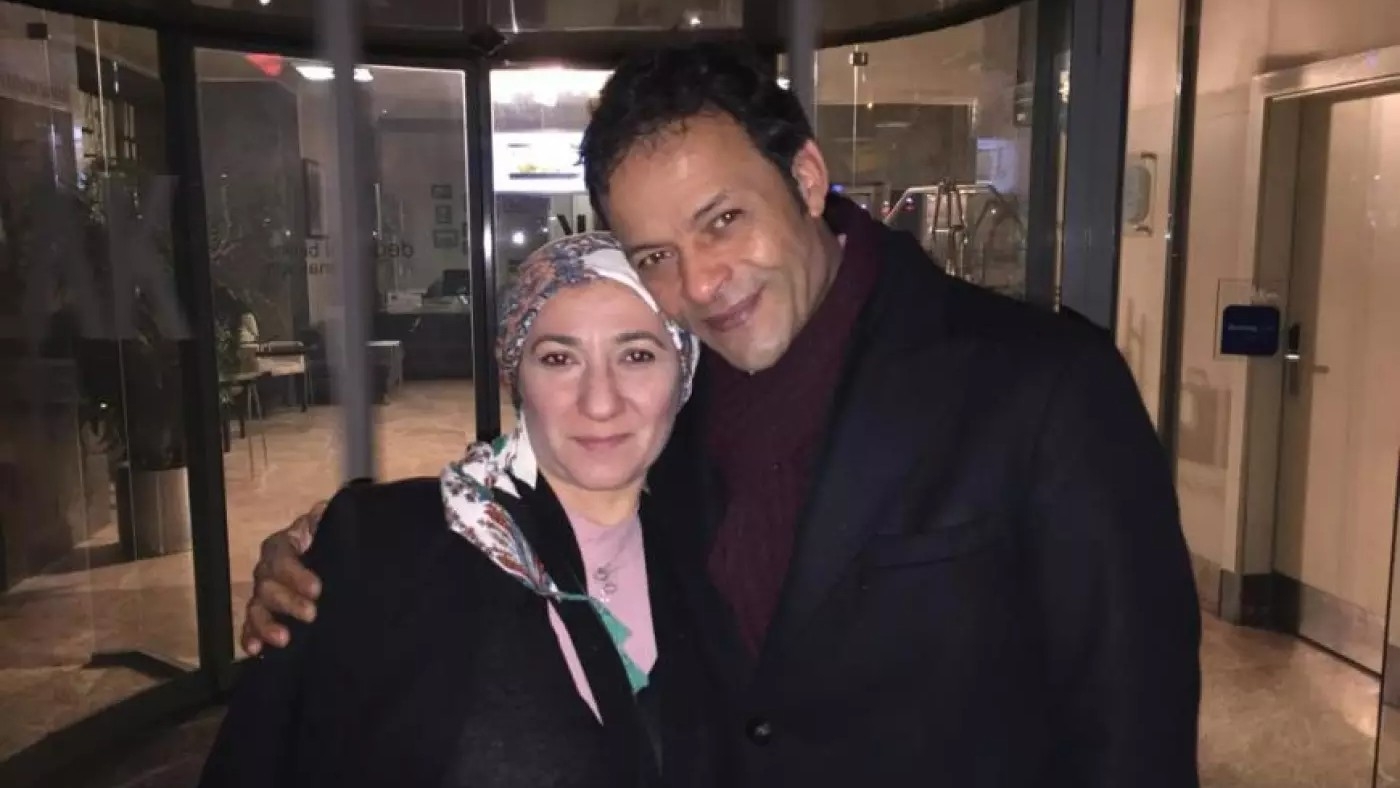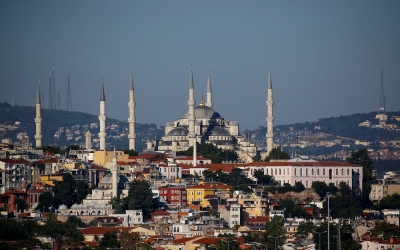'Her hijab was removed': Turkey detains Egyptian dissident Ghada Naguib

Exiled Egyptian opposition activist Ghada Naguib was arrested by plainclothed officers in Turkey on Monday without being given a reason, her son told Middle East Eye, warning she may be deported to Cairo as a result.
Naguib, 51, was detained at 4pm local time on Monday after several cars full of enforcement officers turned up at her house in Istanbul's Basaksehir district.
Her son, Youssef Hisham, was on the phone to Naguib during the arrest.
"The arrest took place in a violent manner," he told MEE. "Her hijab... was removed inside the detention vehicle when she tried to contact the family’s lawyer."
Naguib took part in the pro-democracy movement which removed long-time autocrat Hosni Mubarak in 2011. She later became an outspoken critic of President Abdel Fattah el-Sisi, who deposed the democratically elected Mohamed Morsi in a 2013 military coup.
New MEE newsletter: Jerusalem Dispatch
Sign up to get the latest insights and analysis on Israel-Palestine, alongside Turkey Unpacked and other MEE newsletters
The activist and her husband, Hisham Abdullah, a well-known Egyptian actor, sought exile in Turkey in 2015 with their children.
The family said they suspected that the plainclothed officers who detained Naguib were intelligence officers. MEE has not been able to verify this.
Family members were able to see Naguib for ten minutes at Basaksehir police station, where she told them she had launched a hunger strike. She was given no detail about the reason for being detained.
Middle East Eye has reached out to the Turkish government for comment.
Risk of deportation
After midnight on Monday, Hisham said his mother was taken to the city of Malatya, over 1,100 kilometres from Istanbul.
"Without our knowledge or the knowledge of the lawyers, she was [taken] to the deportation centre for foreigners in... Malatya," Hisham said, citing a police officer. He said he feared she may be deported to Egypt.
In December 2020, Naguib's Egyptian citizenship was revoked, rendering her stateless.
It followed a smear campaign by Egyptian state media against her, after she accused Ahmed Shaaban, a senior intelligence officer, of blackmail.
Hisham said he did not know why his mother was detained, but that his family had been threatened by Turkish authorities for the past two years, coinciding with improved relations between Ankara and Cairo.
"Since the Egyptian and Turkish governments started having negotiations together... there was a lot of threats to my mother to stop writing on social media," Hisham said.
He said those threats were sometimes via phone calls, but also in face-to-face meetings with intelligence officials.
'How come two of the biggest countries in the Middle East are negotiating over the name of one woman?'
- Youssef Hisham, 24
Turkey refused to recognise Sisi as Egypt's legitimate leader following the 2013 military coup that ousted Morsi, who died in prison in 2019.
In February 2019, Erdogan said he would not meet Sisi until Egypt’s political prisoners had been released.
However, the two were pictured shaking hands during the opening ceremony of the World Cup in Qatar last year, and since then, Egypt and Turkey have appointed ambassadors to each others' capital cities for the first time in ten years.
Egyptian opposition activists have previously told MEE that they live in fear in Turkey since the rapprochement between Ankara and Cairo.
"How come two of the biggest countries in the Middle East are negotiating over the name of one woman, a homemaker, who doesn't do anything but take care of her family and write her free opinions on social media?" Hisham asked.
'We feel unsafe and threatened'
Naguib told MEE in 2021 that she was "shocked" by the revocation of her Egyptian citizenship.
“How could they delete my affiliation with my home country simply at the stroke of a pen?” she said.
Egyptian law allows the prime minister to strip anyone of citizenship if they have lived abroad and are convicted of a felony linked to harming state security, as cited in the decree against Naguib.
Authorities claimed she was "originally Syrian". She said that although her father is Syrian, she does not hold Syrian citizenship and has never been to the country.
It is illegal under international law to make someone stateless, though Egypt is not a signatory to the relevant conventions.
Hisham said that as well as threats to their freedom of expression, Turkish authorities had put his family under pressure financially.
His father had initially worked in Istanbul as a TV anchor on the Egyptian opposition Al-Sharq channel. But he lost his job two years ago, as opposition channels were told to either leave or soften their criticisms of Sisi, amid the improvement in Turkish-Egyptian relations.
"They prevented [my father] from working and appearing on any screens," Hisham said. "No one cares where are we getting our income from.
"We always feel unsafe and threatened. And now we don't know what's going to happen with my mother."
Haytham Abokhalil, an Egyptian TV presenter and rights activist, said the arrest was carried out due to a "false complaint" made by Egypt.
"Supposedly Turkey is a country that enforces law on daily basis," he told MEE. "They should have ignored this false complaints coming from a repressive country like Egypt."
Middle East Eye delivers independent and unrivalled coverage and analysis of the Middle East, North Africa and beyond. To learn more about republishing this content and the associated fees, please fill out this form. More about MEE can be found here.





